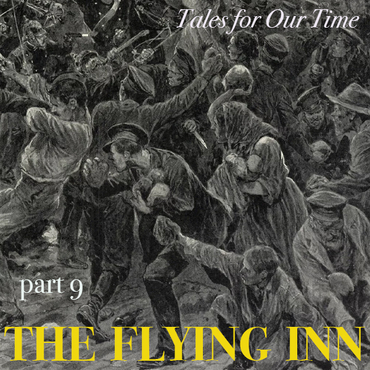Our latest Tale for Our Time charges on: The Flying Inn, G K Chesterton's tale of an England in which the elites make common cause with Islam.
In tonight's episode, following yesterday's raucous and violent close to the Islamic scholar's otherwise triumphant meeting, the account of what actually happened falls into the hands of the gentlemen of the press - and one in particular:
In his early days he had had a great talent for one of the worst tricks of modern journalism, the trick of dismissing the important part of a question as if it could wait, and appearing to get to business on the unimportant part of it. Thus, he would say, "Whatever we may think of the rights and wrongs of the vivisection of pauper children, we shall all agree that it should only be done, in any event, by fully qualified practitioners." But in the later and darker days of his diplomacy, he seemed rather to dismiss the important part of a subject, and get to grips with some totally different subject, following some timid and elusive train of associations of his own. In his late bad manner, as they say of painters, he was just as likely to say, "Whatever we may think of the rights and wrongs of the vivisection of pauper children, no progressive mind can doubt that the influence of the Vatican is on the decline."
Chesterton's observations on the Fleet Street of 1914 and its control of "the narrative" still have relevance today - although, with respect to "riots" and much else, things are evidently much worse. Members of The Mark Steyn Club can listen to Part Nine of our adventure simply by clicking here and logging-in. Earlier episodes can be found here.
Thank you for all your perceptive comments about this latest serialisation. Alison Castellina, a Steyn Club member from the English Home Counties, writes:
I'm torn about the question of whether this story is about Islam or the Temperance Movement i.e. influenced by the social and political concepts of his time and, by accident, ours. Whatever, 'the last rum in England' seems a concept worthy of strong retention. His poem 'The Rolling Road of England' (1913) comes from this book and captures very much our native boozy spirit (in every sense). The lovely last lines are:
'For there is good news yet to hear and fine things to be seen,
Before we go to Paradise, by way of Kensal Green.'
That last trembles on the verge of a plot-spoiler, Alison, although we'll get to it soon enough. As to your point about whether it's about Islam or the Temperance movement, I would say it was intended to be the latter. In American terms, Chesterton was rather anti-Prohibition: While he sympathised with the Protestant booze-banners in the rural heartland, he felt bars and social clubs were essential to the building of community for Catholic immigrants in the cities. He seems to have hit on Islam just to sharpen the contrasts - the Mohammedans being the most fierce Prohibitionists on the planet (although I have drunk beer with Muslims in both Germany and Sweden). But it was a happy accident - because, instead of being a topical satire of his own time, the book has proved brilliantly prophetic of ours.
If you've yet to hear any of our Tales for Our Time, you can do so by joining The Mark Steyn Club. Membership is available now - and, if you sign up, you'll be all set for Part Ten of The Flying Inn this time tomorrow (and all the earlier episodes, of course). And, if you've a friend who likes classic fiction, don't forget our special Gift Membership.
























